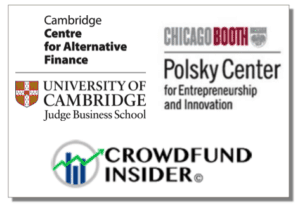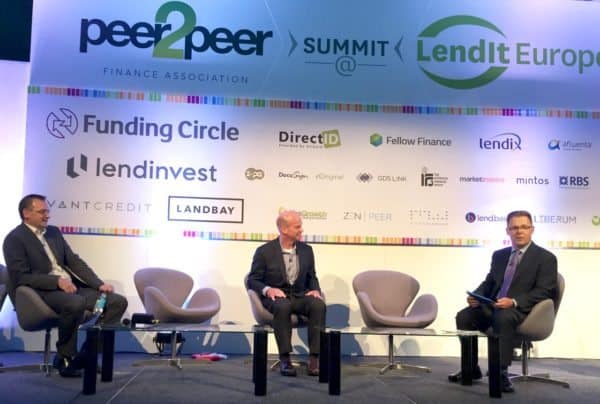“I think Fintech, particularly as it applies to lending, has the capacity to completely transform how consumers and small business use credit. The best platforms are true innovators, underwriting consumers and small businesses in new ways using data that was simply unavailable ten or even five years ago.”
The Centre for Alternative Finance at University of Cambridge Judge Business School and the Polsky Center for Entrepreneurship and Innovation team at Chicago Booth School of Business joined forces to initiate the 2015 Americas Alternative Finance Benchmarking Survey. This landmark survey, the first comprehensive and empirical assessment of crowdfunding, peer-to-peer lending (marketplace lending) and other forms of alternative finance across North, Central and South America, launched in October.
“Over the summer Cambridge and Chicago teams worked together to build a database. We’re now busy reaching out – via email, phone, and study partners – to compile a rich portrait of alternative finance in the Americas,” explained Professor Robert Rosenberg of the University of Chicago Booth School of Business. “Response to date – in English, Spanish, and Portuguese – has been gratifying (if you haven’t completed the survey, it’s available on our website). We appreciate the support of the alternative finance community.”
Supported by the IDB, BDC, KPMG and a number of highly influential industry research partners, major alternative finance industry associations and organizations in the United States, Canada and across Central and South America, including the LendIt/Lend Academy, Crowdfunding Professional Association (CfPA), Crowdfund Intermediary Regulatory Advocates (CFIRA), National Crowdfunding Association of Canada (NCFA), Orchard, Crowdnetic and Queen’s University and the Impact Group have joined the venture. Integral to this research include a series of exclusive interviews with the thought leaders of the collaborating associations and platforms, including Robert Rosenberg and Gabriela Andrade and Diego Herrera of IDB.
 Peter Renton is the founder of Lend Academy, a leading educational resource for the peer-to-peer lending industry. Through his widely-read P2P / Marketplace lending website Lend Academy, blog, podcasts and video courses about direct lending and through his writing, Renton has initiated thousands of people in their understanding of this new asset class. As co-founder of the LendIt Conference, the world’s first conference dedicated to the P2P and online lending industries and co-founder at NSR Invest, an investment and analytics platform that provides access to P2P Marketplaces for financial advisors, institutional investors, and individuals, Renton is globally respected as a P2P guru.
Peter Renton is the founder of Lend Academy, a leading educational resource for the peer-to-peer lending industry. Through his widely-read P2P / Marketplace lending website Lend Academy, blog, podcasts and video courses about direct lending and through his writing, Renton has initiated thousands of people in their understanding of this new asset class. As co-founder of the LendIt Conference, the world’s first conference dedicated to the P2P and online lending industries and co-founder at NSR Invest, an investment and analytics platform that provides access to P2P Marketplaces for financial advisors, institutional investors, and individuals, Renton is globally respected as a P2P guru.
I recently caught up with The Lending Club Story author via email, tapping into his brilliant fintech expertise to learn more about his views on the Benchmarking Survey, regulations, banking and the development of marketplace lending into an powerful industry. Our interview follows.
Erin: Why have LendIt/LendAcademy decided to support the Cambridge-Chicago Americas Benchmarking Survey? How will this research benefit the Marketplace/P2P lending industry?
 Peter: The marketplace lending industry is growing fast but in many ways it is still a nascent industry. There has never been a comprehensive study done on the U.S. market and the industry needs this. The information gained from such a survey will be very useful for the industry as we gain a deeper understanding as to the size, scope and economic impact of marketplace lending. This information will help all industry participants as well as regulators in Washington.
Peter: The marketplace lending industry is growing fast but in many ways it is still a nascent industry. There has never been a comprehensive study done on the U.S. market and the industry needs this. The information gained from such a survey will be very useful for the industry as we gain a deeper understanding as to the size, scope and economic impact of marketplace lending. This information will help all industry participants as well as regulators in Washington.
Erin: The recent Treasury RFI referenced appropriate regulations for online marketplace lending. Do you see policy makers taking advantage of the data gathered?
Peter: Yes, I do. This is one of the primary benefits of a survey such as this conducted by reputable organizations like the University of Cambridge and the University of Chicago. While the Treasury RFI provided valuable feedback for the government, the objective data gained from a survey such as this will be complementary to the subjective responses to the RFI.
Erin: Antonio Weiss, Counselor to the Secretary of the Treasury Jack Lew, spoke at the Information Management Network Conference in New York City last week and declared; “Our guiding principle will remain to seek the broadest possible access to safe, affordable and sustainable credit. We will be mindful to preserve and promote the American entrepreneurial spirit in the growing financial technology industry.” What do you think Treasury was trying to communicate?
 Peter: What the government wants is fair and broad access to credit that is in the best interests of all parties. One of the causes of the financial crisis was a loosening of credit standards, especially in real estate, so no one wants to go down that path again. But today, particularly for small business owners, access to affordable credit is challenging with bank lending still well below the pre-financial crisis levels. Enter the American entrepreneur. New non-bank lenders are expanding access to credit with new technology that allows for more efficient underwriting as well as a broadening of the borrower pool as more data is available today about small businesses than ever before.
Peter: What the government wants is fair and broad access to credit that is in the best interests of all parties. One of the causes of the financial crisis was a loosening of credit standards, especially in real estate, so no one wants to go down that path again. But today, particularly for small business owners, access to affordable credit is challenging with bank lending still well below the pre-financial crisis levels. Enter the American entrepreneur. New non-bank lenders are expanding access to credit with new technology that allows for more efficient underwriting as well as a broadening of the borrower pool as more data is available today about small businesses than ever before.
Erin: What are your thoughts on the Small Business Borrowers Bill of Rights?
Peter: I am a strong proponent of the Small Business Borrowers Bill of Rights. The Truth in Lending Act, that ensures fair and transparent loan pricing for consumers, has been in place for many decades. But no such protections are in place for small business borrowers. There are many different kinds of financing options available for small business owners, many of which have opaque pricing and are difficult to understand. The Small Business Borrowers Bill of Rights is an attempt to address this with a commitment to fair transparent pricing on small business loans.
Erin: Recently Matt Burton referenced a statement by Mike Cagney of SoFi. Burton asked the question as to what does fintech want to be when it grows up. What do you think fintech should become?
 Peter: I read the article from Matt Burton and I think he posed a good question. I think Fintech, particularly as it applies to lending, has the capacity to completely transform how consumers and small business use credit. The best platforms are true innovators, underwriting consumers and small businesses in new ways using data that was simply unavailable ten or even five years ago. We don’t just want to move a traditional lending process online, that only has a limited value, we want to take a fresh look at the entire lending process and fix the pieces that are inefficient and broken.
Peter: I read the article from Matt Burton and I think he posed a good question. I think Fintech, particularly as it applies to lending, has the capacity to completely transform how consumers and small business use credit. The best platforms are true innovators, underwriting consumers and small businesses in new ways using data that was simply unavailable ten or even five years ago. We don’t just want to move a traditional lending process online, that only has a limited value, we want to take a fresh look at the entire lending process and fix the pieces that are inefficient and broken.
Erin: How do you see traditional banking evolving? Are they dinosaurs oblivious to the asteroid that is about to hit? How can they evolve?
 Peter: This year it has become clear that leaders at the largest banks are far from oblivious about this industry. Most banks are taking notice and thinking about some kind of strategy. As I see it there are four options for banks as they evolve amid the growth of marketplace lending:
Peter: This year it has become clear that leaders at the largest banks are far from oblivious about this industry. Most banks are taking notice and thinking about some kind of strategy. As I see it there are four options for banks as they evolve amid the growth of marketplace lending:
- Build their own platform from scratch – this is what Goldman Sachs is doing and several other large banks are rumored to be doing.
- Buy an existing platform – the valuations are such that most banks would find this option unpalatable.
- Partner with an existing platform – there have been dozens of banks pursue this option already.
- Stick their head in the sand and do nothing – some banks see marketplace lending as too small right now to be overly concerned.
I believe that option 3 is going to be the most common option going forward for all but the largest banks. This has been happening for 2 1/2 years now and more banks are coming on board every month. The big advantage for banks is that they can offer new products for their customers for very little cost and they can choose only those loans that fit their credit box. This is a compelling proposition for many banks.
Erin: Several years back, early peer-to-peer lenders were stymied when the SEC decided that they were issuing securities and, therefore, should be regulated by the SEC rather regulated in a similar way to a bank. Do you think this ruling was appropriate? How has this decision impacted the evolution of online lending?
Peter: I understand where the SEC was coming from when they made this decision back in 2008, but in hindsight it is clear to me that this was a bad decision. The SEC was trying to protect small investors from this unproven asset class that appeared to be quite risky. In reality, online consumer lending has demonstrated it is a very stable investment with low volatility. Keep in mind that both Lending Club and  Prosper were established before the financial crisis and investor returns in 2008-09 were far better than pretty much every other asset class.
Prosper were established before the financial crisis and investor returns in 2008-09 were far better than pretty much every other asset class.
The impact the SEC decision has had on this industry has been a movement away from retail investors. Since that ruling in 2008 not one company has launched for non-accredited investors, every new platform has launched for either institutional investors only or for a combination of institutional and accredited investors. So everyday investors have been left out. This, despite the fact that over 99% of investors with a well-diversified portfolio of consumer loans (at least 100) receive a positive return on their investment every year. Not many asset classes can claim that track record.
Erin: You are a co-founder of NSR Invest, a platform that offers institutional type tools for smaller investors. How is this platform growing?
Peter: NSR Invest has built tools for financial advisors to easily and efficiently access P2P lending opportunities. Since announcing our integration efforts with Orion Advisor and Lending Club, account growth has accelerated materially. Over the past 90 days, we have grown our managed accounts at an annualized rate of over 200%.
Erin: What’s your vision for LendIt/LendAcademy and where do you see the marketplace lending industry in the next 3 years? 5 years?
Peter: Before I answer that question let’s look back five years and see how far we have come. I started writing about this industry five years ago this month. Back then to call it an industry was a stretch. There were only two companies operating a marketplace, Lending Club and Prosper, and they offered just one product: unsecured consumer loans. No institutional investors participated, all loans were funded by individual investors. Total originations for the “industry” was less than $15 million per month.
Today, we have marketplaces across pretty much all loan verticals: consumer, small business, student, real estate and auto. Monthly originations now measure in the billions and some of the largest asset managers on earth, including Blackrock – the largest, are now deploying money in marketplace lending. Many balance sheet lenders are adding marketplaces because they realize a diversified investor base as a better way to run their business.
 In 3-5 years, we are going to see an accelerated pace of change. Lending is going through a transformation, like so many other industries have done, with today’s consumers demanding a better experience than their parents and grandparents. The borrower of tomorrow will want an online or smartphone-centric loan application process that is quick and efficient. They will expect lenders to be able to gather a complete credit picture on them and make instant approval decisions based on just a small amount of information entered. In five years time most large banks will have a completely online borrower process as the movement towards branchless lending will be well under way. A significant percentage of all loans issued will come from a marketplace with a loan just as likely to be funded by a bank as a mutual fund dedicated to this asset class.
In 3-5 years, we are going to see an accelerated pace of change. Lending is going through a transformation, like so many other industries have done, with today’s consumers demanding a better experience than their parents and grandparents. The borrower of tomorrow will want an online or smartphone-centric loan application process that is quick and efficient. They will expect lenders to be able to gather a complete credit picture on them and make instant approval decisions based on just a small amount of information entered. In five years time most large banks will have a completely online borrower process as the movement towards branchless lending will be well under way. A significant percentage of all loans issued will come from a marketplace with a loan just as likely to be funded by a bank as a mutual fund dedicated to this asset class.
Both LendIt and Lend Academy will be major contributors to this growth. LendIt will continue to be the annual industry gathering for the lending industry – the term online lending and even marketplace lending will eventually go away and in five years time it will just be called lending. Lend Academy will continue to cover the industry news and developments and will help investors navigate the many options that will be available to them.
____________________________________________
Main benchmarking survey link:
-
https://www.surveymonkey.com/r/AltFinAmericas
- For Spanish version: https://es.surveymonkey.com/r/AltFin_Spanish
- For Portuguese version: https://pt.surveymonkey.com/r/AltFin_Portuguese
- For Canadian Platforms: https://www.surveymonkey.com/r/AltFin_Canada
________________________________________________
 Crowdfund Insider has joined with The University of Cambridge and University of Chicago Booth School of Business to be the exclusive media partner on this benchmarking research. This interview is one of a series that includes multiple, in-depth interviews with international thought leaders and alternative finance industry pioneers from the collaborating associations.
Crowdfund Insider has joined with The University of Cambridge and University of Chicago Booth School of Business to be the exclusive media partner on this benchmarking research. This interview is one of a series that includes multiple, in-depth interviews with international thought leaders and alternative finance industry pioneers from the collaborating associations.
For benchmarking research enquiries please contact:
Dr. Olena Verbenko, Chicago Booth School of Business (Olena.Verbenko@ChicagoBooth.edu)
Tania Ziegler, Cambridge Centre for Alternative Finance, Cambridge Judge Business School (tz285@cam.ac.uk)
About the University of Cambridge and the University Chicago
University of Cambridge
This research is led by the Cambridge Centre for Alternative Finance, Cambridge Judge Business School. The Cambridge Centre for Alternative Finance is an international, interdisciplinary, academic research institute, dedicated to the study of alternative finance, which includes financial channels and instruments that emerge outside of the traditional financial system (i.e. regulated banks and capital markets).
Examples of alternative finance channels are online ‘marketplaces’ such as equity and rewards-based crowdfunding, peer-to-peer consumer/business lending, and third-party payment platforms. Alternative instruments include SME mini-bonds, private placements and other ‘shadow banking’ mechanisms, as well as social impact bonds and community shares used by non-profit enterprises and alternative currencies. The mission of the University of Cambridge is to contribute to society through the pursuit of education, learning and research at the highest international levels of excellence.
University of Chicago Booth School of Business
The University of Chicago Booth School of Business is consistently ranked among the top five business schools in the world. The school’s faculty includes renowned scholars and its graduates occupy key positions in the US and worldwide. The Chicago Approach to Management Education is distinguished by how it leverages fundamental knowledge, its rigor, and its practical application to business challenges.
The school offers full and part-time MBA programs, a PhD program, open enrollment executive education and custom corporate education with campuses in Chicago, London, and Hong Kong.



